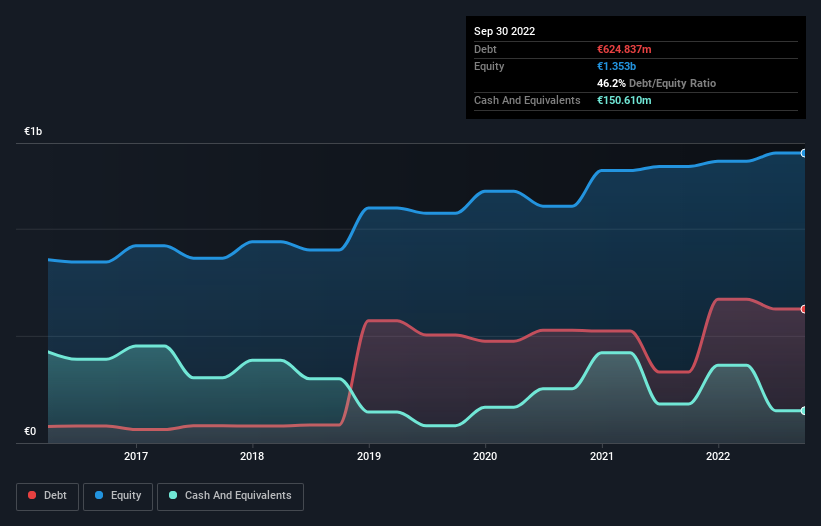- Hong Kong
- /
- Personal Products
- /
- SEHK:973
L'Occitane International (HKG:973) Has A Pretty Healthy Balance Sheet

David Iben put it well when he said, 'Volatility is not a risk we care about. What we care about is avoiding the permanent loss of capital.' It's only natural to consider a company's balance sheet when you examine how risky it is, since debt is often involved when a business collapses. We note that L'Occitane International S.A. (HKG:973) does have debt on its balance sheet. But the more important question is: how much risk is that debt creating?
Why Does Debt Bring Risk?
Generally speaking, debt only becomes a real problem when a company can't easily pay it off, either by raising capital or with its own cash flow. In the worst case scenario, a company can go bankrupt if it cannot pay its creditors. However, a more common (but still painful) scenario is that it has to raise new equity capital at a low price, thus permanently diluting shareholders. Having said that, the most common situation is where a company manages its debt reasonably well - and to its own advantage. The first thing to do when considering how much debt a business uses is to look at its cash and debt together.
View our latest analysis for L'Occitane International
How Much Debt Does L'Occitane International Carry?
You can click the graphic below for the historical numbers, but it shows that as of September 2022 L'Occitane International had €624.8m of debt, an increase on €331.5m, over one year. However, it does have €150.6m in cash offsetting this, leading to net debt of about €474.2m.

How Strong Is L'Occitane International's Balance Sheet?
The latest balance sheet data shows that L'Occitane International had liabilities of €733.6m due within a year, and liabilities of €983.9m falling due after that. On the other hand, it had cash of €150.6m and €308.1m worth of receivables due within a year. So it has liabilities totalling €1.26b more than its cash and near-term receivables, combined.
While this might seem like a lot, it is not so bad since L'Occitane International has a market capitalization of €3.40b, and so it could probably strengthen its balance sheet by raising capital if it needed to. However, it is still worthwhile taking a close look at its ability to pay off debt.
We measure a company's debt load relative to its earnings power by looking at its net debt divided by its earnings before interest, tax, depreciation, and amortization (EBITDA) and by calculating how easily its earnings before interest and tax (EBIT) cover its interest expense (interest cover). This way, we consider both the absolute quantum of the debt, as well as the interest rates paid on it.
L'Occitane International has a low net debt to EBITDA ratio of only 1.2. And its EBIT easily covers its interest expense, being 25.6 times the size. So you could argue it is no more threatened by its debt than an elephant is by a mouse. Another good sign is that L'Occitane International has been able to increase its EBIT by 26% in twelve months, making it easier to pay down debt. When analysing debt levels, the balance sheet is the obvious place to start. But ultimately the future profitability of the business will decide if L'Occitane International can strengthen its balance sheet over time. So if you want to see what the professionals think, you might find this free report on analyst profit forecasts to be interesting.
Finally, a business needs free cash flow to pay off debt; accounting profits just don't cut it. So we clearly need to look at whether that EBIT is leading to corresponding free cash flow. Happily for any shareholders, L'Occitane International actually produced more free cash flow than EBIT over the last three years. There's nothing better than incoming cash when it comes to staying in your lenders' good graces.
Our View
Happily, L'Occitane International's impressive interest cover implies it has the upper hand on its debt. And that's just the beginning of the good news since its conversion of EBIT to free cash flow is also very heartening. Looking at the bigger picture, we think L'Occitane International's use of debt seems quite reasonable and we're not concerned about it. After all, sensible leverage can boost returns on equity. Over time, share prices tend to follow earnings per share, so if you're interested in L'Occitane International, you may well want to click here to check an interactive graph of its earnings per share history.
If, after all that, you're more interested in a fast growing company with a rock-solid balance sheet, then check out our list of net cash growth stocks without delay.
New: AI Stock Screener & Alerts
Our new AI Stock Screener scans the market every day to uncover opportunities.
• Dividend Powerhouses (3%+ Yield)
• Undervalued Small Caps with Insider Buying
• High growth Tech and AI Companies
Or build your own from over 50 metrics.
Have feedback on this article? Concerned about the content? Get in touch with us directly. Alternatively, email editorial-team (at) simplywallst.com.
This article by Simply Wall St is general in nature. We provide commentary based on historical data and analyst forecasts only using an unbiased methodology and our articles are not intended to be financial advice. It does not constitute a recommendation to buy or sell any stock, and does not take account of your objectives, or your financial situation. We aim to bring you long-term focused analysis driven by fundamental data. Note that our analysis may not factor in the latest price-sensitive company announcements or qualitative material. Simply Wall St has no position in any stocks mentioned.
About SEHK:973
L'Occitane International
Engages in the design, manufacture, and retail of various natural and organic ingredient-based beauty and well-being products in Asia pacific, the Americas, Europe, the Middle East, and Africa.
High growth potential low.
Similar Companies
Market Insights
Community Narratives



